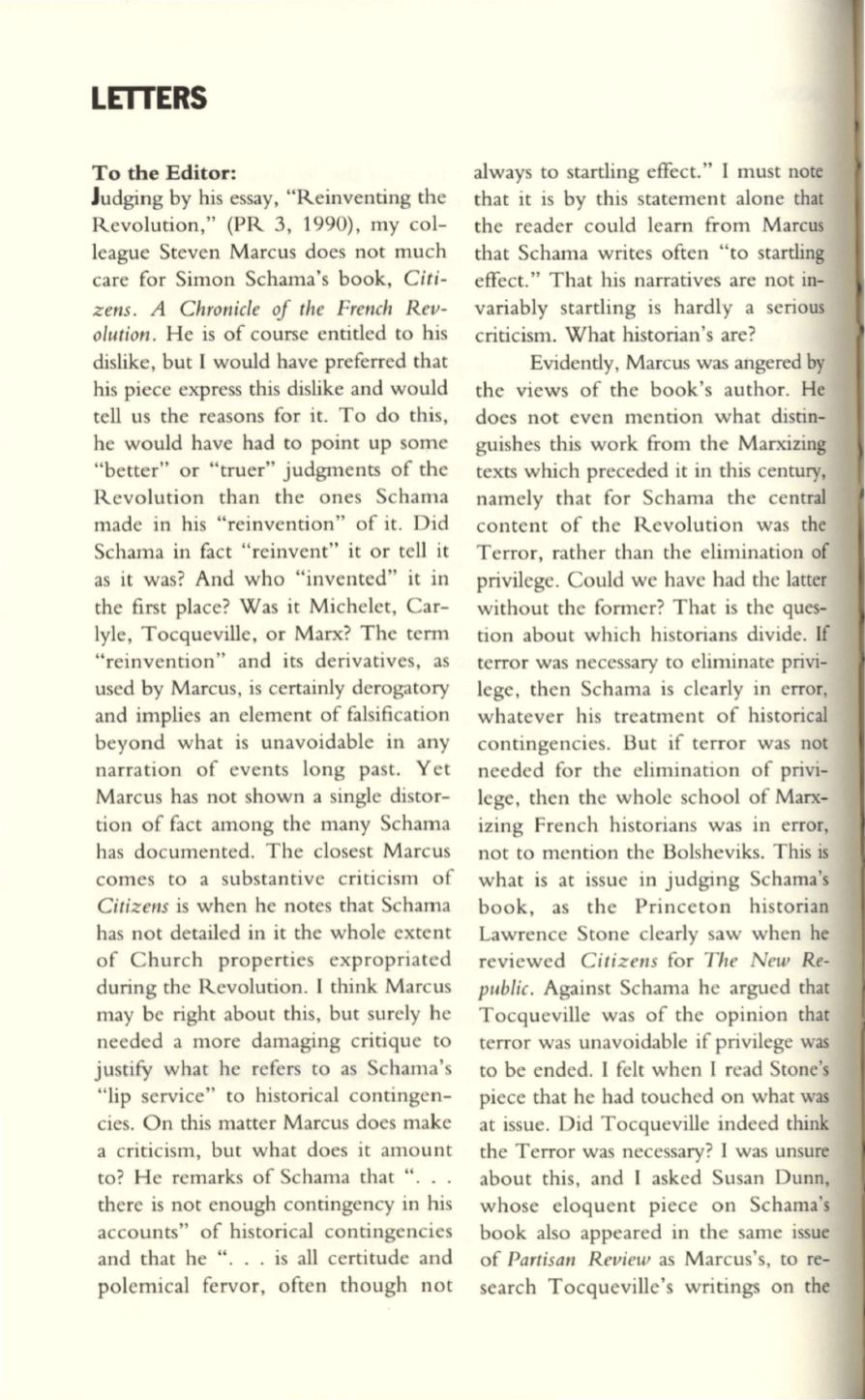
LmERS
To the Editor:
Judging by his essay, "Reinventing the
Revolution," (PR 3, 1990), my col–
league Steven Marcus does not much
care for Simon Schama's book,
Citi–
zens . A Chronicle of the French Rev–
olution .
He is of course entitled to his
clislike, but I would have preferred that
his piece express this clislike and would
tell us the reasons for it. To do this,
he would have had to point up some
"better" or "truer" judgments of the
Revolution than the ones Schama
made in his "reinvention" of it. Did
Schama in fact "reinvent" it or tell it
as it was? And who "invented" it in
the first place? Was it Michelet, Car–
lyle, Tocqueville, or Marx? The term
"reinvention" and its derivatives, as
used by Marcus, is certainly derogatory
and implies an element of falsification
beyond what is unavoidable in any
narration of events long past. Yet
Marcus has not shown a single distor–
tion of fact among the many Schama
has documented. The closest Marcus
comes to a substantive criticism of
Citiz ens
is when he notes that Schama
has not detailed in it the whole extent
of Church properties expropriated
during the Revolution. I think Marcus
may be right about this, but surely he
needed a more damaging critique
to
justify what he refers to as Schama's
"lip service" to historical contingen–
cies. On this matter Marcus does make
a criticism, but what does it amount
to? He remarks ofSchama that " ...
there is not enough contingency in his
accounts" of historical contingencies
and that he " ... is all certitude and
polemical fervor, often though not
always to startling effect." I must note
that it is by this statement alone that
the reader could learn from Marcus
that Schama writes often "to startling
effect." That his narratives are not in–
variably startling is hardly a serious
criticism. What historian's are?
Evidently, Marcus was angered by
the views of the book's author. He
does not even mention what distin–
guishes this work from the Marxizing
texts which preceded it in this century,
namely that for Schama the central
content of the Revolution was the
Terror, rather than the elimination of
privilege. Could we have had the latter
without the former? That is the ques–
tion about which historians divide. If
terror was necessary to eliminate privi–
lege, then Schama is clearly in error,
whatever his treatment of historical
contingencies. But if terror was not
needed for the elimination of privi–
lege, then the whole school of Marx–
izing French historians was in error,
not to mention the Bolsheviks. This is
what is at issue in judging Schama's
book, as the Princeton historian
Lawrence Stone clearly saw when he
reviewed
Citiz ens
for
Th e New Re–
public.
Against Schama he argued that
Tocqueville was of the opinion that
terror was unavoidable if privilege was
to be ended. I felt when I read Stone's
piece that he had touched on what was
at issue. Did Tocqueville indeed think
the Terror was necessary? I was unsure
about this , and I asked Susan Dunn,
whose eloquent piece on Schama's
book also appeared in the same issue
of
Partisan Review
as Marcus's, to re–
search Tocqueville's writings on the


